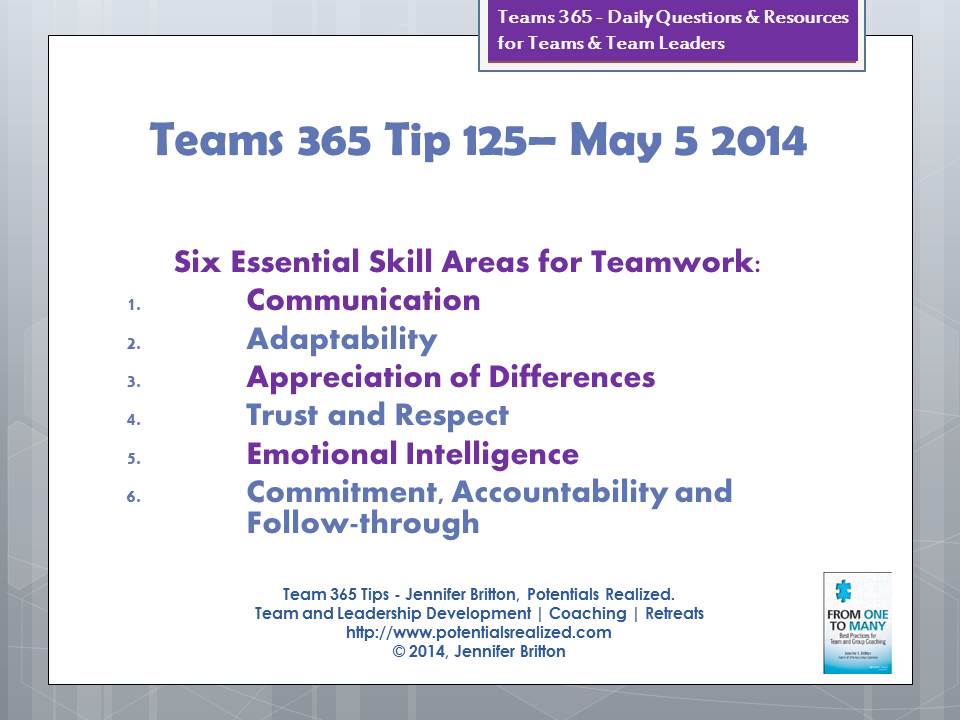As you read the article, which ones are strengths for your team right now? Which ones are needing some attention?
Six Essential Skills For TeamWork
For effective team work to occur there needs to be a foundation of a clear vision and purpose of the team. Teams will want to consider these questions: What is the purpose of the team? Why do we exist? Why is it important to operate as a team, rather than individual contributors? What is our vision for where we are going? Is this vision this aligned, and shared by all? Does every team member know how their role and work impacts this vision and purpose or mission?
1. Communication - Communication is critical for effective teamwork. Communication consists of several factors - listening as well as our words, body language and pace. A reminder that communication is not only what we say. In fact, in face to face communication, body language contributes to almost 55% of the message, followed by words at 7% and tone, pace and pitch at 38%. These figures shift when we switch to telephone based calls where we lose the cues of body language. In email, the balance shifts again given that tone is lost. Via email our words carry the weight.
On a team, communication is not only what is said, it is also what is not said on a team. What is the team not speaking about? What difficult conversations may need to be had?
Linked to communication is listening. What is the quality of listening on the team? Are team members really paying attention to what others are saying as well as paying attention to the other non-verbal cues which exist? In contrast, are team members so eager to "get a word in" that they are not really listening to what the other person is saying, rather focusing on what they want to say.
What are your team's strengths in the areas of communication? Where is there opportunity to develop these further?
2. Adaptability - Against the business context of doing more with less, and ongoing change, adaptability has never been more important. The ability to change course regularly, think critically and be resilient is critical for teams who want to be at the top of their game.
How adaptable is your team overall? The members of your team? How important is adaptability in your context?
3. Appreciation of differences - There can be tremendous diversity that exists in any team. From different working styles, to professional backgrounds, priorities and even generations, effective teams appreciate differences. Part of this appreciation requires a look at how team members are similar, and how they are different. Finding out more about each team members preferences and styles can create understanding rather than lead to conflict. For example, one team member may be very detail oriented, whereas another team member is a "broad strokes" thinker. Knowledge of our individual preferences and styles allow us to be more sensitive to our biases and how we need to adapt our approaches in interaction with each other. This topic goes hand in hand with the emotional intelligence of the team.
How does your team appreciate and work across differences? What are the differences, synergies and strengths which exist on your team?
4. Trust and Respect: Trust and respect is a critical requirement for any team. If each team member does not have the other's back, then members of the team operate within their own silos. Likewise, getting things done is highly dependent on the team trusting each other, and sharing the resources and information required to get tasks accomplished.
What is the level of trust and respect in your team?
5. Emotional Intelligence - Emotional Intelligence, or EI, is increasingly getting more attention from leaders these days. Emotional intelligence is " The capacity for recognizing our own feelings, and those of others, for motivating ourselves, for managing emotions well in ourselves and our relationships." (Daniel Goleman, Harvard Business Review). Individuals and teams who are strong in emotional intelligence possess self-awareness (awareness about one's self), social awareness (awareness about others), relationship management (ability to develop strong relationships) as well as self-management (the ability to control emotion).
6. Commitment, Accountability and Follow-through - Teams exist to produce results. Commitment to the goals (shared and individual) required to achieve the results are critical. Accountability and follow-through is often lacking in many teams. What are you as a team collectively, and individually, committed to doing or undertaking to move the team forward? How are you creating this accountability and checking in? Is there a touch point for circling back to check in on progress around action steps or is it assumed that everyone has followed through. High performing teams come to agreement around how actions will be tracked, and put a focus on this consistently.
What is your team committed to? What supports the team in terms of accountability and follow-through?
In closing, which of these areas does your team excel in already? Which areas will you as a team benefit from developing?
Article Source: http://EzineArticles.com/7478604

 RSS Feed
RSS Feed





